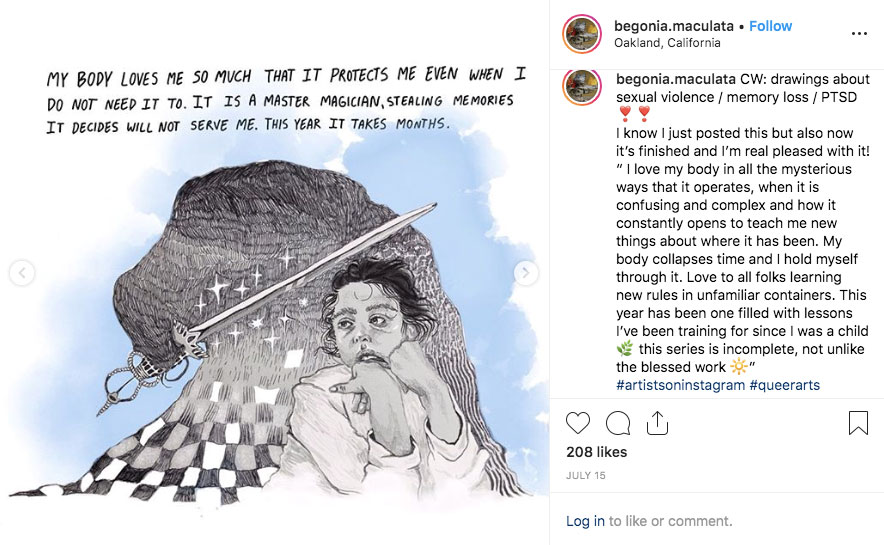Memoirs are performances of memory. To choreograph memory, you have to be lucid enough to move with it, to bend to it, to place yourself before it and know there’s always more to learn.
In Sandra Simonds’ “Real Poetry is Always Connected to the Revolutionary Spirit,” the poet writes: to label poetry as ‘autobiographical’ reduces its power to the individual life when what’s important isn’t so much the individual life as the social relations of lived experiences and how those relations are representative of a much larger system of exploitation and alienation. As, in Simonds’ Orlando, a book with layers of memoir—moment, memory, remembering—embedded in its proliferating verse, the mundanity of a teenage girl’s diary magnifies into something Dantean. Like how, at the end of Purgatorio, Beatrice calls out Dante’s name—but Simonds calls out her own. She sprawls out her own, in ink pen.
Simonds quotes her own diary throughout the book, often to foreground the violences which catalyze lyric, to muddy the high lyric with the material (as invoked on the first page: failure, ink of the adolescent’s diary that comes off so easy). She documents abuse received at the hands of an ex named Craig. She quotes his maxim—pain is just pain—a verbal deluding of her own experience, an attempted cooption of trauma.
Craig doesn’t just abuse the poet; he wants to take ownership of her pain, too. In a move both swift and baroque, fluid and crystallized, she—tens of pages later—establishes an ever-active poetics of the real, the material. She does this, too, in subversion of Craig’s warped ideology. She writes, manifesto cut into verse—the real dragged into the poem—
Dragging the real
into the poem
from the real
of the open form
until it transforms
into a vocabulary
rich and true,
white-cap sea dealt deathly
structured of a pearl,
“I just feel this pain,”
some vision so frail
you might fail to
think it’s real
In Simonds’ poetry, the material holds itself as an open form. Living turns pearl-like in language. Living complicates the language of the lyric, white-cap sea dealt deathly, in the inclusion of the poet’s voicing: I just feel this pain. And who is this ‘you’? If Craig, the reader sees Simonds upend her abuser’s sense of reality, stability. She pulls the rug out from under him without apology. If this ‘you’ is the reader, however, Simonds shows how meaning, material, voicing—I just feel this pain—continues to embed itself through the book’s unfurling.
I just feel this pain.
Like a voice overheard from a balcony.
Like a body running through heat.
Like a body catching its breath in momentary shade.
I write in this vein, I have been writing in this vein, my body held out—but this time I’m the one who holds my body, I’m the one who shows my hand, my own vein exposed and sheathed by the page.
I went through a rapid sequence of EMDR sessions—Eye Movement Desensitization and Reprocessing—as a twenty-year-old in Boston. At the end of the sessions, my psychotherapist was stunned that it only took ten weeks for me to integrate years of displaced memories into my body. I might have been dying until the time I stumbled to her practice, but I was thinking every day—What is this Knife? What is this Nothing? Memory works even when you don’t want it to. I was ready to process the moment I showed up because I was remembering from somewhere else, from out-of-body. I was ready to process the moment I showed up because I didn’t want to die. And my love was beside me each time: holding me as I stumbled, hypnotized, toward the subway, where we’d ride like Alice Notley’s Alette to our home. Sun in our eyes.
For a long time, I projected memory onto place, oftentimes to the extent of rendering an entire environment uninhabitable. My firm refusal to spend time in Pittsburgh, for example, was the consequence of an abusive relationship. No matter how hard I worked to digest an act of abuse, some memories remained parasitic to place.
And I worked hard to digest: my body immobilized by a man’s, and then another’s, and then another’s; my empathy being exploited into an inevitably fallible ideal of salvation, in several iterations; and later, a man telling me he never would have been with me if only he had known the weight of my experiences. To be denied because of unwanted violence. To be denied because of a projected idea of emotional processing. To be denied because of a projected idea of emotional stunting.
And I worked hard, still, to digest: men telling me about times they might have assaulted a woman, and needing me to console them, to carry their anxiety with them, to validate them. To be—again, again—denied autonomy. A specific motel off the interstate to Traverse City would forever wrench my gut. There was, in that microscopic sense, nothing I could do but acknowledge the presence of a parasite.
From the mouth of a funnel, an imagined Herculean underworld spectacle in Orlando: We’ve talked about you. From the mouth of an echo. Like—it’s a small world after all, but with flame.
I just feel this pain.
It becomes a refrain, beyond the body of the poet, beyond the body of the memoir-cum-verse, the remembering-in-verse, the poem as a mirror. It refracts out.
If this is a manifesto, I want it to be held with others. I know it goes on with and without me.
After I finished graduate school in the Midwest, my landlord threatened to take me to court for money I didn’t owe him. He called me repeatedly. He left me voicemails, traces of violence wherein I heard his sons in the background backing him up—call us, don’t write to us, they sneered. They wanted me pinned in their spotlight.
Eventually, I called. Within my first sentence—I’ve already moved out, you knew this, we had amended the lease, and I don’t owe you any more money—he cut me off, laughed at me, called me a little girl. Everything I said went past him, was cut short, and came misdirected, back to me, as a blade. I was crumpled to the floor by the end of our conversation. I traced the grains of wood on the floor below me with my eyes, disassociating, blurring.
In Indiana, if a landlord harasses their tenant, the tenant is legally entitled to break the lease immediately. When I told him a week later that I’d take him to court for harassment, he told me I could keep my money. He asked me to leave him alone. I was shocked—leave me alone, coming from a man who had dogged me.
I slept the rest of the day, flashbacks pulling me and in and out of time.
I traced the light through the window, imagined it reverberating on glass.
I traced the light of my phone—until I saw a tweet from a man I used to be close to: “If you’re in your twenties and you’re writing a memoir…bitch, that’s called a diary.”
Later that night, on Instagram, I saw an artist post a series of narrative illustrations on PTSD. One illustration read: On days when my body stages break ins I am left to piece together clues from a clean crime scene. A bruise is thrown across the room and left draped along the back of an armchair. A smell is pinned to my headboard with a nail.[1]
This thrown-ness, this pinned-ness, might be why I write. Who, after all, throws? Who, after all, pins? Who else is thrown, and how might I reach them? What living turns pearl-like in language?
And when I stop saying I just feel this pain, I’m turning my head toward a pearl: hovering on the horizon, swelling—slowly—into something bigger, more captivating.
Footnotes:
This essay could be called an annotation of my “On Nothing,” published by Queen Mob’s Teahouse in September 2018.

About the Author
AM Ringwalt is a writer and musician. The recipient of the 2019 Sparks Prize as a graduate of the University of Notre Dame’s MFA in Poetry, her words most recently appeared or are forthcoming in the Bennington Review, Interim and the Kenyon Review. Her manuscript What Floods was a finalist for Essay Press’ 2018 book prize and was longlisted for Tarpaulin Sky’s 2019 book prize. Called “haunted” by The Wire and “deceptively rich” by Bandcamp, her music can be found at annemalin.bandcamp.
